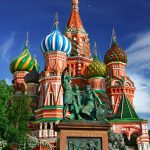
Russia, which hosted a fabulous football World Cup last year, plans to give tourists visa-free entry and to use electronic visas along the lines of those used by Australia and many other countries.
President Vladimir Putin told the Business Russia forum in Moscow that to promote tourism, Russia must adopt short-term visa-free entry for foreigners, along with electronic visas.
“We’re not going to achieve anything through bans in tourism or any other areas,” Putin said, according to Russia’s Sputnik news service.
“We must also switch to a wider use of electronic visas. It’s obvious.”
Tourists arriving on cruise ships at Saint Petersburg can currently stay in the city, a grand repository of European art, for three days without a visa and “this practice must be generalised and expanded” throughout Russia, Putin said.
For Russia, eliminating the need for visas would be like removing the cork from the tourism bottle.
Currently, to enter the Russian Federation for tourist purposes, foreigners (including Australians) must possess a valid visa. A Russian tourist visa can be issued for no longer than 30 days and when entering Russia, visitors may also be asked to present at the border checkpoint their tourist confirmation, voucher and a return ticket with a fixed date of departure from Russia. Visitors must also prove they have sufficient funds for their trip.
As last year’s FIFA football World Cup proved, pretty much everyone who visits Russia loves it, with Moscow and St Petersburg especially favoured. Visitors from Australia praised the Russian spirit and its people’s friendliness. They were knocked out by the cleanliness and beauty of Moscow and other Russian cities, and the bargain prices. See: Romantic, friendly, happy Russia confounds critics
Putin did warn, however, that ease of entry shouldn’t be achieved at the expense of security.
Russia’s move towards lifting restrictions for tourists would be done “gradually and carefully,” he said.

St Basil’s Cathedral, Red Square, Moscow
Putin pointed out that Russia’s visa-free experiment for the FIFA World Cup, which saw 3.4 million tourists arriving using just their Fan-IDs as entry papers, created a few problems.
So-called Fan-IDs were issued to non-Russians when they bought a World Cup ticket. But Putin said a number of foreigners “under the guise of football fans” had sneaked into Russia with the aim of crossing illegally into neighbouring countries, including those in the European Union.
During the World Cup, Finnish authorities intercepted illegal immigrants from Morocco, Nigeria and China, some crossing from Russia and applying for asylum.

The Winter Palace in St Petersburg, artistic treasure-house and former main residence of the Russian tsars
Russian police arrested Moroccans near the Norwegian border. They were fined and deported. Russia shares a frontier with several countries in the European Union’s 19-nation Schengen travel zone. Illegal immigrants, mainly from Africa and Asia, try to gain entry to Russia to cross into Finland and Norway, or filter into Belarus, which has a general lack of checks on its frontier with Russia and has borders with Poland, Latvia and Lithuania.
Written by Peter Needham
















